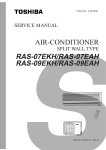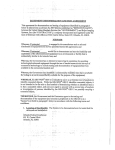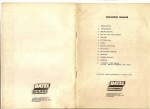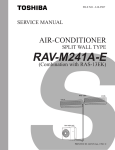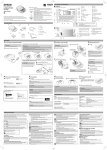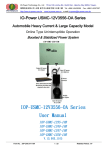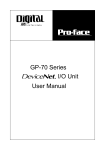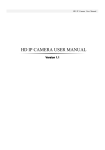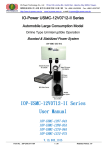Download RAC-08EW-E
Transcript
FILE NO. A00-9607 SERVICE MANUAL ROOM AIR-CONDITIONER PORTABLE TYPE RAC-08EW-E PRINTED IN JAPAN Mar., 1996 S CONTENTS 1. SPECIFICATIONS .............................................................................................................. 3 2. SPECIFICATIONS OF ACCESSORIES ............................................................................. 3 3. APPEARANCE ................................................................................................................... 4 4. SPECIFICATIONS OF ELECTRICAL PARTS .................................................................... 4 5. WIRING DIAGRAM (RAC-08EW-E) .................................................................................. 5 6. COOLING CHARACTER CHART ...................................................................................... 6 7. REFRIGERATING CYCLE DIAGRAM.............................................................................. 7 8. MICROCOMPUTER BLOCK DIAGRAM ............................................................................ 8 9. OPERATION DESCRIPTIONS ........................................................................................... 9 9-1. Operation Control Knobs on Control Panel ........................................................................................ 9 10. OUTLINE OF OPERATIONS.......................................................................................... 10 10-1. 10-2. 10-3. 10-4. Basic Operation ................................................................................................................................ 10 Economy Mode ................................................................................................................................ 10 Dry Mode .......................................................................................................................................... 11 Economy Operation .......................................................................................................................... 11 11. TROUBLESHOOTING CHART ...................................................................................... 12 11-1. What to be Prechecked First ............................................................................................................ 12 11-2. How to Judge Faulty Parts by Symptoms ........................................................................................ 13 11-3. PC Board Layout .............................................................................................................................. 22 12. INSTALLATION INSTRUCTION ..................................................................................... 24 12-1. 12-2. 12-3. 12-4. 12-5. Installation Method ........................................................................................................................... Routine Maintenance ....................................................................................................................... Water Supply .................................................................................................................................... Changing of Water ........................................................................................................................... Relocation of Air Conditioner ............................................................................................................ 24 24 24 25 25 13. CLEANING METHOD OF CONDENSER ....................................................................... 26 13-1. Condenser Servicing Procedures ..................................................................................................... 26 14. EXPLODED VIEWS AND PARTS LIST .......................................................................... 27 Note: A special tool is required to remove the back cabinet. (In EXPLODED VIEWS AND PARTS LIST, Location No. 256 “Screw Driver”) – 2 – 1. SPECIFICATIONS Model Item Dimensions Height mm 720 Width mm 500 Depth mm 315 kg 35 Frequency Hz 50 Rated voltage V 1 phase, 220/230/240 Cooling capacity kW Airflow, high m3 /h 390/400/410 Moisture removal lit/h 1.2 Running current A 3.82/3.80/3.85 Power consumption W 780/800/840 Net weight Power source Standard performance Electrical characteristics Compressor RAC-08EW-E 2.10/2.18/2.18 Power factor 93/92/91 Model, output PH94X1-4G1, 750W Ripple tube type, Forced air ventilation Condenser Finned tube type, Aircooled ventilation Evaporator Finned tube type, Aircooled ventilation Safety devices Float switch, Over current relay Fan motor (for indoor and exhaust) 20W, Induction motor Refrigerant R-22, (Charged quantity, 0.47 kg) Air filter Polypropylene net filter Power cord 3-core (One core for grounding), 1.9 m (6.4 ft) length with plug Accessories Exhaust hose, Caster seat, Exhaust hole, Cap for exhaust hole Specifications are subject to change without notice. 2. SPECIFICATIONS OF ACCESSORIES Item Remarks Q'ty Exhaust hose 1 Caster seat 4 Exhaust hole 3 Cap for exhaust hole 3 1.4m Caster seat – 3 – Exhaust hole Cap for exhaust hole 315mm (12.4 in) 3. APPEARANCE Economy switch Wind direction control grille (horizontal) Sub cabinet Air filter 500mm (19.7 in) Operation switch (ON/OFF) Air inlet Back cabinet Control panel Handle Connector of exhaust hose Air outlet 720mm Wind direction control grille (Vertical) Water tank Holder of power cord Case of hose Front door 39mm (1.5 in) Caster 420mm (16.5 in) (1.8 in) 45.5mm Power cord (220/240V) 285mm (11.2 in) (28.3 in) Front panel 230mm (9.1in) 1.9m (6.4ft) Drain hose 120mm (4.7 in) Fig. 3-1 4. SPECIFICATIONS OF ELECTRICAL PARTS Parts name Type Specifications Single phase, 50 Hz, 220/230/240V ~, AC. 750W output Compressor PH94X1-4G1 Winding resistance (Ω) (at 20°C) Red-Black White-Black Red-White 4.55 8.55 13.1 Single phase, 50 Hz, 230V, AC. 20W output Fan motor STF-230-20-4C EARU40M206UF Running capacitors Relay Winding resistance (Ω) (at 20°C) Red-Black 205.0 Black-Orange Orange-Blue 145.9 400V, 20µF (for compressor) EEP2H105HWNB05 500V, 1µF (for fan motor) AJE6412 250V, 3A (for fan motor) PC12D2 250V, 15A (for compressor) Float switch FS-085-002F Transformer FT67-2 Rated current, 0.1A 100V DC Primary 220V ~ 240V, Secondary 12.3V ~ 13.6V Microcomputer TMP47C440AN Room temperature sensor (Ta-sensor) (Microcomputer) Differential ±2°C, Adjustable range 17 ~ 28°C Heat-exchanger sensor (Tc-sensor) (Microcomputer) Differential ±2°C Copper wire minimum 1.0 mm2 Power supply cord with plug Fuse 111.1 TSCR 6.3A – 4 – Black-Orange 102.5 5. WIRING DIAGRAM (RAC-08EW-E) THERMO SENSOR (ROOM TEMPERATURE) HEAT EXCHANGER SENSOR FLOAT SWITCH 1 2 1 2 CN02 1 2 1 2 CN04 1 2 1 2 CN05 CONTROL PC BOARD CN01 1 2 3 1 2 3 WHI CN06 1 1 2 2 3 3 4 4 5 5 6 6 7 7 8 8 9 9 10 10 11 11 12 12 13 13 14 14 RED TRANSFORMER BLU BLU CN08 CN07 C35 VARISTOR OPERATION PANEL PC BOARD R26 VARISTOR SURGE ABSORBER DSA CR03 RY01 RY02 RY03 F01 FUSE 6.3A SINGLE 50Hz 220/230/240V~ BLU RUNNING CAPACITOR GRN&YEL BRW 4 2 CR01 BLK 3 1 RY07 RELAY CR02 1 2 3 4 5 6 1 2 3 4 5 6 CN03 RED GRY RUNNING BLU CAPACITOR COMPRESSOR ORN BLK WHI WHI FAN MOTOR RED RED BLK Fig. 5-1 – 5 – Color Identification GRY BRW WHI BLK RED BLU GRN &YEL : : : : : : : ORN : GRAY BROWN WHITE BLACK RED BLUE GREEN & YELLOW ORANGE 6. COOLING CHARACTER CHART Cooling Capacity kW 2.7 2.6 2.5 2.4 2.3 2.2 Humidity 2.1 2.0 70% 1.9 60% 1.8 50% 40% 1.7 32 31 30 29 28 27 26 25 24 23 Ambient temperature Fig. 6-1 – 6 – 22 21 20 19 18 17 C 7. REFRIGERATING CYCLE DIAGRAM RAC-08EW-E Delivery tube I.D : 4.8 mm O.D : 6.0 mm Main condenser (Water) Sub condenser (air) T2 Capillary tube I.D : 1.2 mm O.D : 2.04 mm Length : 400 mm Compressor Evaporator T1 Suction tube I.D : 6.8 mm O.D : 8.0 mm Fig. 7-1 RAC-08EW-E Table 7-1 Conditions Cooling Surface temp. of heat exchanger interchanging pipe (°C) Ambient temp. conditions DB/WB (°C) T1 T2 Indoor Outdoor Standard 10 50 27/19 35/24 High temperature 17 57 32/23 43/26 Low temperature 5 34 21/15 21/15 Note: Measure the heat exchanger temperature at the center of U-bend. (By means of thermistor thermometer.) – 7 – 8. MICROCOMPUTER BLOCK DIAGRAM Mode selector (Cool/Dry/Fan only) 3-minute delay at Restart for Clock frequency oscillator circuit Initializing circuit Functions Operation indicator compressor Start-up Compensation for fan Economy indicator motor Timer Economy indicator Processing Warning indicator (Temperature processing) Timer selector (ON, CONTINUE, OFF) Timer setting C.P.U. Air flow selection (Fan selector High, Low, AUTO) Fan motor signal Compressor ON/OFF signal DC 5 volt DC 12 volt AC input Operation (ON/OFF) Relay driver Transformer Power relay Economy selection (ON/OFF) Remote control unit Power supply circuit AC 50Hz 220/230/ 240V Temperature setting Miniature relay Room temperature sensor (Ta sensor) Heat-exchanger sensor (Tc sensor) Relay driver Control unit Compressor Fan motor A bold line denotes a 220/230/240V AC line. Fig. 8-1 – 8 – 9. OPERATION DESCRIPTIONS 9-1. Operation Control Knobs on Control Panel MODE knob TIMER knob Set to a desired time. Use to select the operation mode COOL, DRY, or FAN ONLY. THERMO knob FAN SPEED knob The AUTO position automatically changes the fan speed according to room temperature. During DRY and ECONOMY mode, LOW is used regardless of the setting. The scale gives just a rough mesure of the temperature setting. TIMER SELECT knob Upon expiry of the number of hours set using the TIMER knob, the air conditioner starts operating if the knob is set at ON or stops operating if the knob is at OFF. With the knob set at CONT., the air conditioner continues operating regardless of the TIMER setting. FAN ONLY DRY:COOL MODE HIGH LOW:AUTO 18 20 22 24 26 28 C 2 4 6 8 10 12 Hr. THERMO FAN SPEED OFF CONT. ON TIMER TIMER SELECT RAC-08EW-E WARNING TIMER ECONOMY OPERATION I/O I/O button Lamps OPERATION (green) This lamp will light up during the COOL, DRY, or FAN ONLY operation. It begins flashing if a power failure occurs. ECONOMY (green) This lamp will light up when you push the ECONOMY button. TIMER (yellow) This lamp will light up when the TIMER SELECT knob is set to ON or OFF. WARNING (red) ECONOMY Push this button to start the air conditioner, push it again to stop it. ECONOMY button This lamp will light up when the water in the tank runs out. When the tank is refilled, the lamp will go off. The red lamp flashes during abnormal operation. To turn off the lamp, push the ON/OFF button. Waiting about five minutes, push the button again, the OPERATION lamp will light up and the air conditioner will start operating. Fig. 9-1 – 9 – Push this button to start the economy operation, push it again to cancel the economy operation. 10. OUTLINE OF OPERATIONS Room temperature +2 C +1 C Setting temp. -1 C (4) To adjust the room temperature, set the knob mounted on the control panel at desired temperature. The room temperature sensor detects and controls the adequate temperature. (5) When the FAN SPEED selector switch is set to “AUTO”, the volume of air is controlled to be felt agreeable. Zone E (3) When the I/O button is pushed with the timer set at any desired time, the relays are all disabled and the air conditioner stops when the timer reaches the set time. However, if the operation is started with the timer set to “CONTINUE”, the operation continues. +3 C Zone F (2) When the I/O button is pushed again, the relays are all disabled, and the air conditioner stops. +4 C Zone C This control mode establishes some zones corresponding to different combinations of on and off intervals of the compressor and selects a suitable zone depending on the lapse of time from the start of operation and the temperature. Zone D (1) When I/O button is pushed, the relays RY01, RY02 or RY03 and power relay RY07 start according to the conditions set by FAN SPEED knob selector switch. Thus, the indoor fan motor and compressor are controlled. (Operations as described in this paragraph are all programmed. And following items are same as it.) Zone A 10-2.Economy Mode Zone B 10-1.Basic Operation 1H 2H 3H Monitoring (when room temperature is not higher than the set temperature) Time Fig. 10-1 Table 10-1 During cooling Lapse from start Zone Compressor A ON OFF 18 – 4 minutes B ON OFF 3 – 4 minutes C ON OFF 5 – 7 minutes D ON OFF 3 – 7 minutes E ON OFF 5 – 10 minutes F ON OFF 3 – 10 minutes 0 to 1 hour 1 to 2 hours 2 hours ~ Table 10-2 During drying Lapse from start Zone Compressor A ON OFF 5 – 4 minutes B ON OFF 3 – 4 minutes C ON OFF 5 – 7 minutes D ON OFF 3 – 7 minutes E ON OFF 5 – 10 minutes F ON OFF 3 – 10 minutes 0 to 1 hour 1 to 2 hours 2 hours ~ – 10 – 10-3.Dry Mode In this mode, a microcomputer control lowers humidity while maintaining a constant temperature. The microcomputer turns the compressor on and off at regular intervals (3 to 6 minutes on and/or off). During the halt, the airflow fan stops as well. Compressor 6 minutes a The compressor and airflow fan will operate independent of the temperature control, though the pattern of operation depends on the relation between room temperature (TA) and set temperature (Ts), as shown below: b Table 10-3 Stop Airflow fan Stop Low Low Stop Stop Low Stop Stop Low Stop Stop Relation between room temp. (TA) and set temp. (TS) OFF period a ON period b TA > T S + 2 4 min. 6 min. TS + 2 > TA > TS 5 min. 5 min. T S > TA 6 min. 3 min. Room temperature (TA ) measurement timing Time The airflow fan will operate in the Low position, independent of the position of the airflow setting control. Fig. 10-2 10-4-2. Dry Operation 10-4.Economy Operation (1) When the economy button is pushed, the economy lamp is lit and the economy operation will start. (But this operation will not start in the mode of fan only.) (2) The economy operation with the cooling and dry modes will be performed in the manner as stated below. (1) ON/OFF interval operation both of the compressor and fan will be performed (At the OFF time, both of the compressor and fan will be set to OFF.) (2) Wind capacity is of L. (3) An interval operation will be performed in Ta ≥ Ts condition. 10-4-1. Cooling Operation (1) The compressor will be operated by means of ON/OFF interval operation. (2) The room fan will be controlled as stated below: • When compressor is turned on: L 10-4-3. Fan Operation (1) When operation change over switch is set to fan operation, the economy operation shall not be executed. And the economy lamp shall not be lit too. (Normal fan operation will be performed.) • When compressor is turned off: UL Ta • When monitoring: OFF (3) An interval operation will be started from OFF time. But when starting operation, it will be kept in ON position for 6 minutes. +3 18 min ON -4 min OFF 5 min ON -7 min OFF 5 min ON -10 min OFF 3 min ON -4 min OFF 3 min ON -7 min OFF 3 min ON -10 min OFF +2 +1 Ts Monitoring (Compressor, OFF. Fan, OFF) 1 2 Fig. 10-3 – 11 – Time 11. TROUBLESHOOTING CHART Troubleshooting procedures: • Following the details of “What to be prechecked first”, make sure of the basic items. • When there is no trouble corresponding to above, check in detail the faulty parts following “How to judge faulty parts by symptoms” later. 11-1. What to be Prechecked First 11-1-1. Power Voltage The power voltage must be from AC 198V to 264V. If the power voltage is not within this range, the air conditioner may not work normally. 11-1-2. Operations not Regarded as Failure (Program Operation) In terms of the control of air conditioner, the operations shown in Table 11-1 are made as a program operation incorporated in a microcomputer. If a claim is made about the operation, check it corresponds to the contents in Table 11-1. If it does, it is an indispensable operation for the control and maintenance of the air conditioner but not a failure of the units. • Operations which are not deemed trouble Table 11-1 Operation of air conditioner Description When the POWER plug socket of the unit is inserted, the operation lamp on the control panel flashes. The operation lamp flashes indicating that power is turned on. If this happens, push the I/O button once, and flash will stop. Power failure also causes the same lamp to flash. Room temperature is in the range under which the compressor is turned on and the operation lamp is lighting, but the compressor will not start. The compressor will not start while the compressor restart prevention timer (three-minute timer) is actuated. This applies also when power is turned on. Fan speed remains unchanged when the fan speed knob is operated in the dry mode. Fan speed is fixed at Low in the dry mode. The indoor fan occasionally stops intermittently in the dry mode. In the dry mode, the fan operation is synchronized with the compressor. As a result the fan is stopped when the compressor is stopped. The compressor will not switch on or off even when the Thermo control is operated in the dry mode. In the dry mode, the compressor goes on and off at regular intervals independent on the Thermo control. Warning lamp is lit and no cold air comes out. When water in the tank has been drained out, stop the operation of the compressor for safety. Fill the water in the tank. Warning lamp blinks and no cold air comes out. When the temperature in the freezing cycle (high pressure side), stop the operation of the compressor for safety. Be sure that the exhaust port has plugged with something or water is not remain in the exhaust hose. At the mode of fan only, the economy lamp is not lit when the economy button is pushed. In case of the fan only mode, the economy lamp will not be lit since the economy control will not be performed. The push button has not returned when the economy button is pushed. The economy button is of lock type. When the button is pushed again, the button is set to OFF and the button will come out. The operation button will come out all the time since it is not of lock type. – 12 – 11-2. How to Judge Faulty Parts by Symptoms One of the most important matters for the repair of air conditioners is accurate trouble analysis. For this purpose, it is required to make a correct judgement about the problem by asking the user. 11-2-1. Trouble Analysis Classification a No power turns on. 1 Unit is inoperable. Totally inoperable c All relays do not work. 2 Breaker or fuse blows out. 3 Only fan does not work. Trouble analysis classification At cooling and drying operations,the compressor works,but the fan does not run. 4 Compressor does not operate. (Fan is also inoperable.) Lamp flashes. Some parts are inoperable. 5 Compressor does not operate. 6 Unit repeats ON/OFF frequently. Short cycles. 7 Cooling is not obtained or insufficient. 8 Drying is not obtained or insufficient. Operable but abnormal. 9 Water leaks. 10 Abnormal noise. – 13 – 11-2-2. No Power Turns On (Air Conditioner Does Not Operate) <Precheck> (1) Is voltage to wall socket normal? (3) Is water filled in the tank? (2) Has cord plug fully sealed in the socket? (4) Is timer set in timer mode? (Is timer select switch set to ON?) <Checking Procedures> Turn power switch OFF, wait 5 seconds and turn switch ON again. Operations Check items NO Major possible causes Does operation lamp on control panel flash? YES Remedies NO Item by symptom When the control panel "I/O" button is turned ON, does power go on? YES (Normal) NO Is DC 12V (Q01 "E"),DC5V(Q02 "E") of voltage indicated on rear of control PC BOARD ASS'Y normal? YES NO Is the DC voltage between pin 2 of CN06 control panel connector and GND 5V? YES Control PCB ass'y is faulty. Control panel ass'y is faulty. Replace Replace 11-2-3. All Relays Do Not Work <Checking Procedures> Turn power ON. Operations Check items Major possible causes Does operation lamp on control panel flash? NO See item "NO power turns on" YES Remedies Item by symptom Is 12VDC (Q02 "E") voltage indicated on rear of control PCB normal? YES Control panel ass'y is faulty. Replace – 14 – NO Control PCB ass'y is faulty. 11-2-4. Only Fan Does Not Work <Precheck> (1) Does fan rotate even in the cool mode and the fan only mode? <Checking Procedures> Turn power ON. Operations Check items NO Does operation on control panel flash? See items "NO power turns ON" Major possible causes YES Remedies Do fan relays RY01,RY02 and RY03 change over? NO Item by symptom Points to which multimeter probes are applied Polarity (+) Q02"E" (+ 12V) Normal voltage value Polarity ( ) Condition Pin 2 of RY01 Pin 2 of RY02 Pin 2 of RY03 When each relay is ON DC12V YES Check power supply for Fan motor NO Relay is faulty. Points to which multimeter probes are applied (Connector CN03) Note: Check the relays with the fan motor Normal voltage value Condition RY01 (BLK) M RY02 (ORN) L RY03 (BLU) Replace. H COM (RED) When each relay is ON AC220/230/240V YES MF capacitor is faulty. Replace MF capacitor. NO Fan motor is faulty. Replace Fan motor. YES Check Fan motor winding resistance NO Points to which multimeter probes are applied . Polarity (+) BLACK Polarity ( ) RED BLUE WHITE BLACK ORANGE BLUE ORANGE Condition Disconnect fan motor lead wire Nolmal resistance value ( W ) 49 47 32 32 – 15 – 11-2-5. Compressor Does Not Operate <Precheck> (1) Is room temperature control on the control panel higher than room temperature in the cool mode? (2) Is the MODE selector knob on the control panel left set to “FAN ONLY”? <Checking Procedures> Turn power ON. Operations Check items NO Does operation lamp on remote controller flash? See item "No power turns ON". YES Major possible causes Remedies NO Does operation lamp come on normally? Item by symptom YES NO Does power relay RY07 change over? Points to which multimeter probes are applied Polarity (+) Polarity ( ) Condition Q02"E" RY07 5 RY07 ON Chack the voltafge of connector CN02 1 - GND. NO DC Voltage between CN02 and GND Normal voltage value 10 C 20 C 30 C 1.4V 1.4V 1.4V DC11V YES YES Is AC220/230/240V present across 1 - 2 of power relay RY07. NO See "All relays do not work". YES Compressor is faulty. Power relay RY07 is faulty. Replace compressor. Replace power relay. Room temperature sensor is faulty. Replace power relay. – 16 – 11-2-6. Compressor Does Not Operate <Precheck> (1) Is the target room temperature specified by the remote controller assembly higher than current room temperature, in the cool mode? (2) Are the wiring and contacts of connecting cables in a satisfactory condition? <Checking Procedure> Is the voltage across terminals 1 and 2 220/230/240VAC? (Terminal RY07) Check the power relay, PCB assembly. NO Operations Check items YES Major possible causes NO Can the running sound of the compressor be heard? Remedies YES Item by symptom Isn't the starter condenser faulty? NO YES Measure the current. If 3 or 4 times the rated current continues for several seconds, it means the compressor is faulty. Compressor is faulty. Measure the continuity of the compressor. If disconnected, the compressor is faulty. Specitications Single phase, 50Hz, 220/240VAC. 750W output Winding resistance (W ) (at 68 F) Red-Black 4.55 – 17 – White-Black 8.55 Protection Red-White 13.1 I.O.L. Type 11-2-7. The Unit Repeats ON/OFF Operation Frequently Operations Check items Major possible causes NO Does the compressor repeat ON/OFF opertion? Remedies YES Item by symptom Measure the running current. Over current Normal Measure the gas temperature. High Does the fan motor repeat ON/OFF operation? Normal In case the gas temp. and the running current are high. 90 C ~ 105 C (discharge) Heat exchange of the condenser is faulty. Setting of the thermostat is faulty. Correct it. Condenser (water) Condenser (air) – 18 – Control PCB ass'y is faulty. Normal operation 11-2-8. Operable But Abnormal (A) No or insufficient cooling/drying Operations Check items Can the following temperature difference between (Cooling : 14 to 18 F) inlet and outlet air be obtained? (Drying : 23 to 27 F) Major possible causes NO Remedies YES Is the filter blocked? YES Item by symptom Clean the filter. NO No Not blocked. Is the fan speed at "HIGH"? NO Set it to "HIGH". YES Insufficient refrigerant gas? Gas leak? Explain the running conditions again using the instruction manual. Ple a the se c win lose do w Isn't the cooling load excessive? – 19 – In case of insufficient gas, replenishment is according to the gas replenish procedure. (B) Water Leaks Installation condition of the air conditioner is defective. Normal Dew condensation on the external body. Water stays here. Causes: (1) There is a moisture generating source in the room. • Note that, even if a ventilation fan is not in operation, if it is open to the outside, the condition is same as the one in operation. (3) Window has been kept open while raining, and after that, cooling operation is started. • On rainy days, relative humidity may become as high as 90% or higher. If doors or windows are open to the outside, close them. (2) Air volume is remarkably reduced. • Air filter is blocked, resulting in the reduction of air volume. • Low fan operation causes the lowering of running voltage, resulting in the reduction of air volume. • If the voltage is in the range of 198 – 264V, it is normal. (4) When a man goes in and out between a room with high humidity and one with low humidity. Or, in case there is no door between such rooms. – 20 – • Even if there is no moisture generating source in the room where the air conditioner is installed, in case people go in from and out to a room with high humidity frequently, or in case there is no door between the rooms, the situation becomes the same. (C) Abnormal Noise [ Symptom ] Intermittent noise as if something is fluttering in the wind. Air blows in and out at the air discharge port. Obstacle Check if there is an obstacle which hinders the air flow to any extent. No Check whether the air filter is dirty or not. Clean Evaporator Check whether the evaporator is dirty with dust or oil or not. – 21 – 11-3. PC Board Layout Top view – 22 – Bottom view – 23 – 12. INSTALLATION INSTRUCTION Read the installation manual carefully before installing the air conditioner. 4) If the exhaust hose is set with its tip down, the water condensed within the hose might leak out of the room. It is therefore recommended to set the hose with its tip kept higher than the air outlet of the air conditioner properly. The following items in table 12-1 are included as the accessories. Table 12-1 Parts name Q’ty Owner’s manual 1 Installation manual 1 Exhaust hole 3 Exhaust hose 1 Caster seat 4 Cap (for exhaust hole) 3 (2) Put a seat under each caster. (3) Electrical wiring. Table 12-2 12-1.Installation Method Model Power source Plug socket rating Fuse rating RAC-08EW-E 1φ 50 Hz, 220/230/240V 7A 7A 12-2.Routine Maintenance (1) Insert the connection port (round) into the air conditioner surely to its root. 1) The exhaust hose may be extended or contracted from approx. 500 mm to approx. 1,400 mm, but use it in its shortest length if possible. 2) Be careful that a U-shaped bend or slack is not yielded in the way of exhaust hose. 3) When you move the air conditioner, be sure to pull out the exhaust hose and don’t lay down the air conditioner. (1) Be sure to observe the following for a longer service life of your air conditioner. • Cleaning of air filter: Once every two weeks • Changing of water in tank: Once ever week (2) Be sure to drain out the water in tank during every off season. 12-3.Water Supply (1) The water in tank decreases gradually in the course of cooling operation. (2) If the water is run out, the warning lamp lights up (in red) and the operation mode is switched to blowing. Then, refill the water. (3) Open the front door, being down the tank toward you, and lift off the tank. Water stays here. Tank Fig. 12-2 Fig. 12-1 – 24 – 12-4.Changing of Water 12-5.Relocation of Air Conditioner (1) As the water in tank becomes dirty gradually in cooling water, change the water once every week. (1) When you move the air conditioner, be sure to drain out the water in tank first, and do not lay down the air conditioner. Drain hose Fig. 12-3 (2) The water in tank becomes 50° or so in cooling operation. It is abnormal at all. – 25 – 13. CLEANING METHOD OF CONDENSER 13-1.Condenser Servicing Procedures (1) Pull out the air filter. (2) Remove six screws at the back and take off the rear panel. Also, pull out the drain hose from case of hose. (5) Remove two screws fastening the condenser cover (one in the front part and another in the rear). Condenser cover Fig. 13-3 Fig. 13-1 (3) Open the front door and remove the tank. (4) Remove the inner cover (screwed down at five spots). Inner cover (6) Remove the condenser cover by pulling it obliquely upward, then the condenser will be exposed. (7) When assembling, follow the reverse procedures. Tank Condenser cover Fig. 13-4 Fig. 13-2 – 26 – 14. EXPLODED VIEWS AND PARTS LIST 246 204 205 "Special tool" 206 242 256 201 251 255 203 202 209 253 208 236 207 212 210 237 211 238 Location No. Part No. 201 202 203 204 205 206 207 208 209 210 211 43000679 43008399 43003190 43000680 43080332 43019800 43000678 43007917 43007916 43079225 43079226 Description Front Panel Door, Control-Panel Cabinet, Back Cabinet Air-Filter Handle Door, Front Magnet Catch Cover, Hinge Tank, Water Cap, Water-Tank – 27 – Location No. Part No. 212 236 237 238 242 246 251 253 255 256 43079081 43089126 43089127 43089128 43088645 43069760 43068437 43009439 43097200 43082263 Description Cap, Water-Tank Exhaust-Hose Cap, Exhaust Hole Exhaust Hole Owner’s Manual Cord Band Control Panel H-Louver Tamper-Proof-Screw Screw Driver (Tamper-Proof-Screw) 401 402 403 406 404 405 Location No. 401 402 403 404 405 406 407 408 409 Part No. Location No. Description 410 411 412 413 414 415 416 417 43058255 Transformer, FT67-2 43055420 Capacitor, Electrolytic 43060064 Cord, Power 43050341 Thermo-Sensor 43050340 Sensor, Heat Exchanger 43068439 PC Board Assembly 43031090 Diode-Block 43034070 Relay-Miniature, JE-X 43033197 Capacitor, Electrolytic – 28 – Part No. Description 43055359 Toshiba Nonlinear Resistor 43035573 Surge Absorber 43031043 TR, 2SD880Y 43034036 Relay, Power 43060899 Fuse 43055462 Capacitor, EEP Series 43055284 Toshiba Nonlinear Resistor 43055508 Capacitor, CK 408 C29 C22 IC01 C25 C21 C03 R03 C36 C27 R68 R65 R66 R67 C28 C26 D03 +5V R05 C24 R51 R04 R50 C01 R90 C07 E C B 6 R85 Q03 R84 RY07 C34 R83 D20 DB01 C20 E C B Q07 R11 C23 R26 MCC 702 04 COMPONENT SIDE SG01 CR02 411 401 402 403 404 405 406 407 408 35 X01 +5V Part No. R92 R93 10 R94 R95 C32 7 21 R63 R60 R59 R58 15 R57 R61 R71 R22 R21 R20 R70 R72 R64 D01 C02 R01 30 R52 D07 Location No. C31 C30 R82 4 P12 (RED) 3 CN01 25 R80 R81 P11 (BLK) C35 CN07 TC C35 R69 D02 C04 C E Q01 B CR03 R25 R62 22 R74 R76 R76 J02 E F01 P10 412 E C B 1 J01 2 R73 C CR01 CN08 1 42 6.3A 250V~ 414 CN05(RED) 15 D05 C50 P05 CN06 Q02 D06 RY03 1 2 C08 GND R02 RY02 CN04(WHI) 1 TA C E Q02 B R10 C06 415 B C05 E E C B Q06 B C CN03 CN02 2 1 R09 Q05 D04 P06 R08 Q04 RY01 3 5 413 407 Description GCMK C1X R 409 Location No. 43058255 Transformer, FT67-2 43055420 Capacitor, Electrolytic 43060064 Cord, Power 43050341 Thermo-Sensor 43050340 Sensor, Heat Exchanger 43068439 PC Board Assembly 43031090 Diode-Block 43034070 Relay-Miniature, JE-X 409 410 411 412 413 414 415 – 29 – Part No. Description 43033197 Capacitor, Electrolytic 43055359 Toshiba Nonlinear Resistor 43035573 Surge Absorber 43031043 TR, 2SD880Y 43034036 Relay, Power 43060899 Fuse 43055462 Capacitor EEP Series 213 215 217 216 235 220 Drain hose 221 218 219 214 250 254 222 247 223 226 228 225 227 224 Location No. Part No. 213 214 215 216 217 218 219 220 221 222 223 224 43022394 43022395 43022396 43022397 43020249 43072327 43022392 43022393 43020250 43020251 43049666 43072326 230 229 Description Casing, Up Casing, Low Case, Fan, Up Case, Fan, Low Fan, Multi-Blade Drain-Pan Case, Fan, Exhaust Cover, Fan, Exhaust Fan, Multi-Blade Fan, Water Cover, Condenser Water-Vessel – 30 – Location No. Part No. 225 226 227 228 229 230 235 247 250 43051323 43070139 43019829 43079087 43063164 43089106 43011508 43069761 43021870 254 43039306 Description Switch, Float Hose, Water Caster Cap Cover, Switch Seat-Caster Cushion, Sub Wire-Saddle Motor, AC, 230V, 50Hz, Fan STF-230-20-4C Plate, Blower 232 248 234 233 239 Location No. 231 232 233 234 Part No. 231 Description 249 Location No. 43041589 Compressor, PH94X1-4G1 43044543 Evaporator 43043523 Condenser 43043524 Condenser, Air 239 248 249 – 31 – Part No. Description 43095302 Cushion, Rubber 43007890 Holder, Sensor, TA 43063188 Holder-Sensor-TC – 32 – TOSHIBA CORPORATION 1–1, SHIBAURA 1– CHOME, MINATO – KU, TOKYO 105 – 01, JAPAN



































